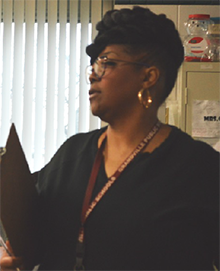For a while now, high school English teacher Sheri Gilreath-Watts has been teaching from Judith Guest’s novel “Ordinary People,” about a suicidal boy home from a mental institution.
“I’m hoping to connect my students to the emotional distress that can come with the teenage years,” she said. “We’re learning about the warning signs that things may not be OK — and this gets real.”
To help students differentiate between typical teenage troubles and serious mental health issues, Gilreath-Watts convened a panel of experts recently and moderated a conversation about some of teenagers’ biggest problems.

The event aimed to offer coping strategies, psychological flexibility to avert mental distress, and even legal consequence to teenager troubles. Panelists included long-time Grandville police officer Dave Greco; licensed professional counselor Isaac Watts; school mental health coordinator Lori Koza; Principal John Philo; special education teacher consultant BrendaOtt; high school guidance counselor Lucas Inman; and Candice Durr, a substance abuse prevention specialist intern.
With anonymous questions submitted by students from the high school, Gilreath-Watts delved into their challenges. There were questions about sexuality, alcohol, drugs and other issues. Terms used in some questions served as an opportunity for the adults to learn.
For example, “Are dabs a felony?”
Koza, like many in the room, assumed the question referred to football’s end-zone touchdown dance, but Greco, the police officer, cleared up the confusion fast. “That’s marijuana. Are dabs a felony? It depends on the quantity.”
Senior Jordan Hufnagel thought the conversation was interesting and found the questions — and answers — informative. Fellow senior Dylan Hardin said he appreciated talking about “topics that we don’t really talk about.”
Koza reminded students that they do not know other people’s stories, “so be kind. It costs you nothing to be kind, (and) the cost of being rude, mean and insensitive can be immeasurable.”
Here is a sampling of students’ questions and responses from the panel.
What are some safe ways to help someone who has anxiety?
Koza, school mental health coordinator: “Anxiety is the very animalistic part of our brain, setting off an alarm that you’re in danger. Unfortunately, our thinking part of the brain isn’t able to discern that we’re probably not facing a charging lion. The same hard-wiring, the same triggers will go off. Adrenaline is pumping through your body and it feels like garbage and you’re panicked. Your heart is racing wildly. Encourage your friend to breathe, in and out. Walk, put on some tunes and just move. As the chemicals rush through your body, that can create more anxiety. Calm, walk, breathe.”

What do you do when you hear voices in your head telling you to do different things?
Watts, professional counselor: “There’s some form of psychosis there, and the situation needs to be evaluated by a mental health professional. Young people, your age and even younger, can receive outpatient counseling without parental knowledge. So sometimes there’s a negative connotation to counseling, that it’s for the weak, (or) ‘I don’t need that.’ Everybody’s got their issues, so why not work through them with someone who can help?”
How do you help a friend get off drugs when they can’t or don’t want help?
Philo, principal: “We’re here, no judgment, because we’re here for you. We work hard to be out in the halls, talking, connecting, recognizing you. Any adult, whether principal, counselor, social worker, lunchroom (staff), or bus driver who works in this school cares immensely about the well being of the young people here. Who is your adult person here, the one that you connect to the most? That’s the person you can go to. We all deal with life challenges, and some of us more than others. It’s hard to seek help. For that, it takes a lot of courage.”
What drives someone emotionally to commit suicide?
Inman, guidance counselor: “For kids not doing well in high school, it might all seem hopeless. But you’re a work in progress. You have a whole lot of life ahead of you, so things can seem bumpy now – that’s OK. Keep your head up. Stay positive. Look for ways to get better. A good coping mechanism is to remind yourself of the good things in your life. Sometimes we focus on the tiniest of bad things and forget the good. Some of the most dejected and broken kids that I have seen in high school comes from a bad break-up. All I want to say is relationships in high school are great learning tools for down the road. If you break up with someone after two years, I get that it will take awhile to get back to normal. Down the road you will benefit and use that experience to make your next relationship more successful.”
CONNECT













